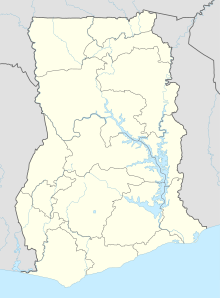The Iduapriem Gold Mine (French: Mine d'or d'Iduapriem) is an open-pit gold mine situated 10 km south of Tarkwa, in the Western Region of Ghana. The mine is owned by AngloGold Ashanti and consists of the Iduapriem and the Teberebie operation, which were merged in 2000.[1][2] AngloGold Ashanti originally only owned 85% of the mine but acquired the remaining 15% in September 2007.[3]
| Location | |
|---|---|
| Location | Tarkwa |
| Region | Western Region |
| Country | Ghana |
| Coordinates | 05°18′N 001°59′W / 5.300°N 1.983°W |
| Production | |
| Production | 190,000 |
| Financial year | 2009 |
| Owner | |
| Company | AngloGold Ashanti |
| Website | AngloGold Ashanti website |
| Year of acquisition | 2004 |
In 2008, AngloGold Ashanti's Ghana operations, consisting of Iduapriem and the Obuasi Gold Mine, contributed 11% to the company's annual production. Both mines became part of AngloGold Ashanti when AngloGold merged with the Ashanti Goldfields Corporation in 2004.[3]
In 2009, the mine employed 1,447 people.[1] The mine has been fatality-free since 1999.[3]
Environmental impact
editThe mine and its owners have been criticised in the past for the loss of land for local farmers, the pollution and drying-up of local rivers and watersources and the lack of action to combat these issues.[4][5]
Mining at Iduapriem was suspended for a time in early 2010 to allow for the construction of a temporary tailings storage facility at the mine.[6] The operators were told by the Environmental Protection Agency of Ghana to suspend operations over "potentially adverse environmental impacts arising from the current tailings storage facility".[7][8]
Mine ownership
editMajority-owned by the Ashanti Goldfields Corporation from 2000 onwards, ownership of this 85% share of the operation was transferred to AngloGold Ashanti with the merger of Ashanti and AngloGold in 2004. The new company owned an 80% share of Iduapriem, with the remaining 20% held by the International Finance Corporation, and a 90% share of Teberebie, with the Government of Ghana holding the remainder. Combined, this accumulated to an 85% share for AngloGold Ashanti in the whole operation.[9] In September 2007, the company acquired the remaining 15% as well.
Production
editProduction figures of the recent past were:
| Year | Production | Grade | Cost per ounce |
| 2002 [12] | 185,199 ounces | 1.66 g/t | US$ 232 |
| 2003 [12] | 243,533 ounces | 1.75 g/t | US$240 |
| 2004 [13] | 147,000 ounces | 1.72 g/t | US$303 |
| 2005 [13] | 205,000 ounces | 1.71 g/t | US$348 |
| 2006 [9] | 196,000 ounces | 1.74 g/t | US$368 |
| 2007 [1] | 185,000 ounces | 1.85 g/t | US$373 |
| 2008 [1] | 200,000 ounces | 1.76 g/t | US$525 |
| 2009 [1] | 190,000 ounces | 1.72 g/t | US$516 |
| 2010 |
- The 2004 results are for the eight month from May to December only.
See also
editReferences
edit- ^ a b c d e Annual Report 2009 Archived 2011-09-12 at the Wayback Machine AngloGold Ashanti website, accessed: 9 August 2010
- ^ Ashanti Goldfields Company Limited announces acquisition of Pioneer Goldfields Limited AngloGold Ashanti website, published: 12 May 2000, accessed: 10 August 2010
- ^ a b c Country report: Ghana - Iduapriem Archived 2012-03-03 at the Wayback Machine AngloGold Ashanti website, accessed: 10 August 2010
- ^ The Impact of the Iduapriem Goldmine in Ghana Archived 2011-07-26 at the Wayback Machine face-it-act-now.org, accessed: 10 August 2010
- ^ Ghana: Iduapriem gold mine pollutes water and cuts off farmers from their lands Food First Information and Action Network, published: 15 April 2008, accessed: 10 August 2010
- ^ AngloGold to resume production at Iduapriem in April miningweekly.com, published: 30 March 2010, accessed: 10 August 2010
- ^ AngloGold suspends Iduapriem mine Archived 2010-02-23 at the Wayback Machine miningmx.com, published: 19 February 2010, accessed: 10 August 2010
- ^ EPA orders Iduapriem Mine to stop using tailings storage facility Archived 2011-07-11 at the Wayback Machine ghanaweb.com, accessed: 10 August 2010
- ^ a b Annual Report 2006 Archived 2011-07-07 at the Wayback Machine AngloGold Ashanti website, accessed: 9 August 2010
- ^ Wright, J.B.; Hastings, D.A.; Jones, W.B.; Williams, H.R. (1985). Wright, J.B. (ed.). Geology and Mineral Resources of West Africa. London: George Allen & UNWIN. pp. 45–47. ISBN 9780045560011.
- ^ Taylor, Ryan; Anderson, Eric (2018). Quartz-Pebble-Conglomerate Gold Deposits, Chapter P of Mineral Deposit Models for Resource Assessment, USGS Scientific Investigations Report 2010-5070-P (PDF). Reston: US Dept. of the Interior, USGS. p. 9.
- ^ a b Ashanti Annual Report 2003 Archived 2006-10-24 at the Wayback Machine accessed: 10 August 2010
- ^ a b Annual Report 2005 Archived 2011-07-19 at the Wayback Machine AngloGold Ashanti website, accessed: 9 August 2010
External links
edit- AngloGold Ashanti website
- Iduapriem mine (GHA-00020) Secretariat of the African, Caribbean and Pacific Group of States website
